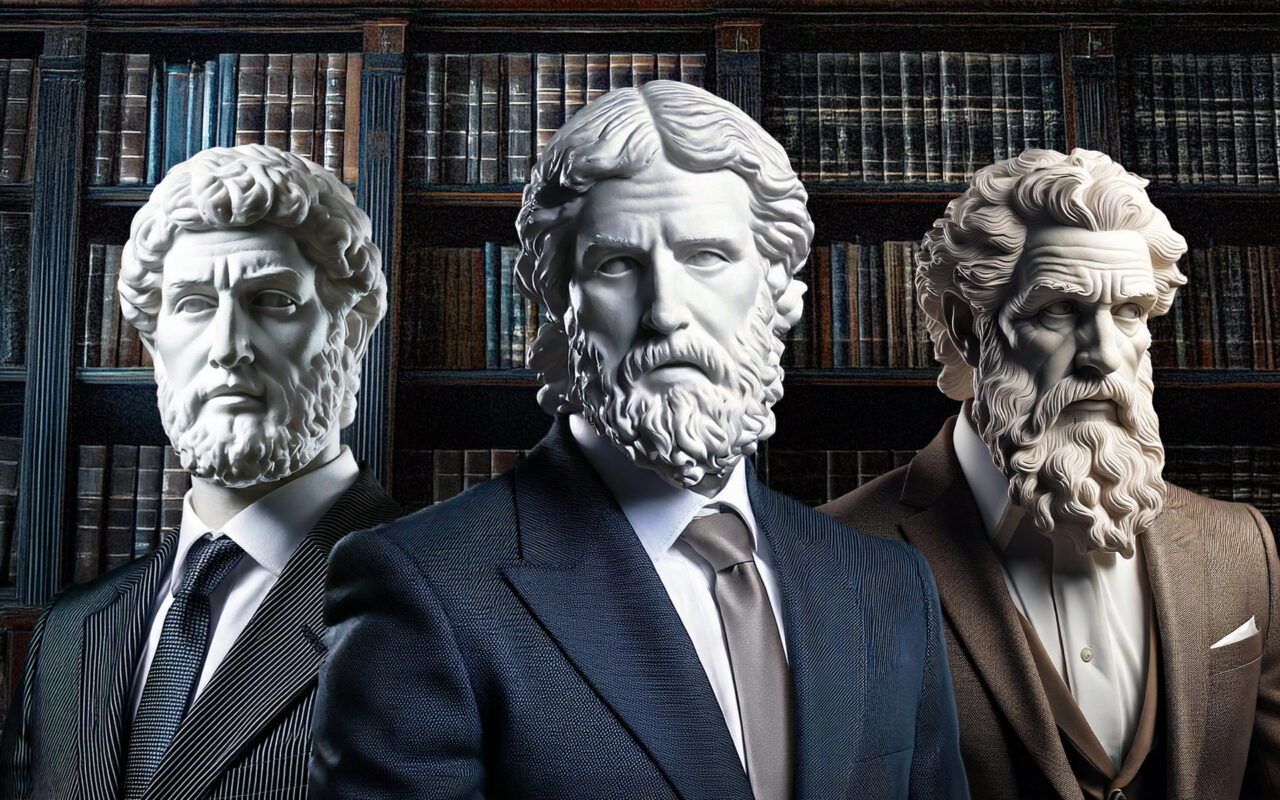Timeless Stoic Wisdom for Business Leaders: 7 Core Principles with Examples
Imagine navigating stressful situations with composure and making decisions with clarity and thoughtful deliberation. Stoic philosophy is making a remarkable comeback, resonating with people across generations and professions.

Many successful business leaders attribute their achievements to the timeless principles of Stoicism. By applying Stoic principles, you can enhance your business with greater self-control, improved efficiency, and make better decisions based on logic. Stoicism helps you to navigate business challenges with resilience and clarity.
Marcus Aurelius, one of the most powerful figures in history, was a dedicated practitioner of Stoicism from age twelve. His commitment to self-control and discipline is a testament to the power of this philosophy.
How can practicing virtue benefit your business and help you thrive?
What Do a Slave and an Emperor Have in Common?
Founded by Zeno in ancient Greece and is based on the teachings of Epictetus, Marcus Aurelius, and Seneca. Epictetus, born into slavery, stated that philosophy is not just a theoretical discipline. His teaching was rooted in practicality.
His teachings influenced the Roman emperor, Marcus Aurelius, who embraced Stoicism at age twelve and remained devoted throughout his life. Applying its principles to his leadership and personal actions. His commitment to virtue-driven leadership significantly elevated his legacy as an emperor.
Stoicism is built around four main virtues: wisdom, courage, temperance, and justice. Stoics believed that practicing these virtues is sufficient to achieve a well-lived life. They focused on taking responsibility for their thoughts and actions, making decisions based on rationality and logic rather than emotions, and not worrying about things beyond their control.
This approach helped them find peace and balance in everyday life. To them, virtue was rooted in three core ideas: logic, physics, and ethics. Together, these elements form a life led by reason and self-reflection.
Ancient Wisdom in Modern Society
Modern Stoicism is based on the same principles but seeks to apply them to modern life challenges. The internet plays a big role in accessibility, with books, podcasts, and courses focusing on making the philosophy easier to understand.
Modern Stoic authors, such as Ryan Holiday or Donald Robertson, also share their knowledge in digestible form on social media. The community aspect of Stoicism is growing, too, with local meetups and online forums where members can discuss the topic and learn about the philosophy.
Principles of Modern Stoicism in Business
How does Stoic philosophy relate to business? Let’s explore.
Good or Bad? Detach and Accept with the Amor Fati Principle
Stoic philosophy teaches us to accept fate as it is. Whatever challenge you’re dealing with, whether it’s bankruptcy or damage to your reputation, Stoicism encourages a rational perspective. It’s about stepping back, viewing the situation from a higher perspective, and accepting it as a part of nature. Once you do that, you can start reframing obstacles into opportunities.
A great example is Walt Disney, who, at the beginning of his career, experienced bankruptcy. Yet, that same year, he launched his film company. Five years later, the same year he lost the rights to Oswald the Lucky Rabbit, Disney created one of the most iconic characters – Mickey Mouse. By turning obstacles into opportunities, he revolutionized the entertainment industry, creating one of the most influential media companies ever.

Lead with Ethics
Stoicism teaches us to do the right thing and to contribute to the common good. You have the power to be the change you want to see in the world. This can mean promoting ethical leadership or taking care of the environment in business.
Yvon Chouinard, the founder of Patagonia, embodies this principle. As a rock climber and environmentalist, Chouinard built Patagonia on the principle of “do no harm,” protecting the planet for future generations. He prioritizes leaving a positive legacy over personal gain.
An inspiring example of ethical leadership is Satya Nadella’s leadership style. He leads with honesty, transparency, and a commitment to fostering a growth mindset for himself and his team. This approach is also reflected in Microsoft’s dedication to ethical technology development and data privacy.
“If we have any hope of a thriving planet – much less a business – it is going to take all of us doing what we can with the resources we have. This is what we can do.” - Yvon Chouinard
Expect the Worst with Negative Visualization
The best way to prepare for the worst is to expect it. This doesn’t mean being anxious; it means taking concrete steps to improve your situation. If things go wrong, you’ll be better equipped to handle it.
By thinking rationally instead of emotionally and regularly considering the worst-case scenario, you can be better prepared for any challenge. The Stoic practice is called negative visualization. It helps build mental resilience and appreciate what you currently have.
What’s your worst-case scenario? Is it a major financial crisis or cybersecurity breach? It’s different for everyone, but negative visualization could be a helpful tool for you to conquer fears.
“He robs present ills of their power who has perceived their coming beforehand.” - Seneca
Focus on What You Can Control
There are very few external things you can control. You can’t control the economy, market trends, external events, or other people’s actions. But you do have control over your own perspective and response. Focusing on what’s within your company’s control is more effective, like building inclusive company culture, refining internal processes, or improving customer experience, rather than worrying about external factors like competitors.
A great example of this approach is Jeff Bezos’s customer focus. He focused on things within Amazon’s control, such as enhancing customer experience, building a reliable infrastructure, and improving internal processes, rather than obsessing over competitors. This approach has played a big role in Amazon’s success.
Sacrifice the Things You Can Afford
According to Stoic philosophy, wealth is beneficial if you don’t become attached to it. As a wealthy man, Seneca regularly for a few days gave up his possessions and lived in poverty to step out of his comfort zone. This practice helped him to avoid being enslaved by comfort and reduced the impact that losing everything could have on his life.
The point of the practice is to avoid getting too attached to material things. This is more relevant than ever in today's consumer society – learning to let go of attachments to mammon.
Many well-known business leaders also embrace simplicity in their lives. For example, Steve Jobs, co-founder of Apple Inc., kept his home largely unfurnished for years and adopted a minimalist clothing style, often wearing the same simple outfit - a black turtleneck and jeans.
By practicing minimalism, he focused on what truly mattered instead of being distracted by material possessions. His minimalist philosophy is reflected in the clean and purposeful product design.
Another great example is Warren Buffett, CEO of Berkshire Hathaway. Even though he’s one of the wealthiest people in the world, he leads a simple and modest life. He still lives in the same home he bought in 1958 and drives a modest car. He is also well-known for his philanthropy, demonstrating that wealth doesn’t have to change your lifestyle or values.
“Were we to use more than 1% of my claim checks (Berkshire Hathaway stock certificates) on ourselves, neither our happiness nor our well-being would be enhanced. In contrast, that remaining 99% can have a huge effect on the health and welfare of others.” - Warren Buffett
Authentic Leadership Begins with Being an Authentic Leader
Stoicism encourages you to accept who you are with all your quirks. It helps you understand who you are and your role in the world. With its emphasis on rationality and honesty, Stoicism teaches you to live in truth to yourself, embracing both the good and the bad.
The core practice is self-reflection, understanding your strengths and weaknesses. Tools like meditation, walks, or journaling can help with this. Stoicism also reminds us that while striving for improvement is important, perfection is unattainable. By accepting our imperfections, we can focus more on growth and less on inadequacies.
An excellent example of an authentic leader is Richard Branson, the founder of Virgin Group. His approach to business is unconventional and true to his adventurous spirit. He consistently takes risks to learn what works and doesn’t, and his unique personality shapes his leadership style. Branson is often seen as an authentic leader, unafraid to be himself in all aspects of his business.

“Death is very likely the single best invention of Life…”
Memento Mori. For Stoics, regularly reflecting on mortality is key to living well. It reminds them of what truly matters and gives their lives purpose and meaning. By keeping death in mind, they avoid stressing over insignificant problems or things they can’t control and focus on meaningful and long-term goals.
Ray Dalio, the founder of Bridgewater Associates, believes in Stoic principles, and embraces memento mori as part of his philosophy. In his book Principles, he discusses life and death, emphasizing the importance of meaningful work and relationships over material success.
Steve Jobs also embraced the memento mori principle, which he famously discussed during his 2005 Stanford commencement speech. Reflecting on his experiences with cancer, he shared how facing mortality shaped his perspective and pushed him to focus on what truly mattered. This mindset led him to focus on creating products with a lasting impact and to value meaningful contributions over just achieving success.
“No one wants to die. Even people who want to go to heaven don’t want to die to get there. And yet death is the destination we all share. No one has ever escaped it. And that is as it should be, because Death is very likely the single best invention of Life. It is Life’s change agent. It clears out the old to make way for the new. Right now, the new is you, but someday not too long from now, you will gradually become the old and be cleared away.” - Steve Jobs
Lead Like a Stoic
Try to experiment with practices like negative visualization to strengthen your resilience or adopt a minimalist approach on certain days each month to see how simplifying your mindset might positively impact your business.
By incorporating Stoic principles—mental clarity, ethical grounding, and emotional resilience—you can improve decision-making and build a sustainable, value-driven business.










